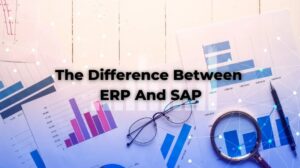In today’s fast-paced business world, efficient management of resources and data is paramount. To achieve this, companies often turn to Enterprise Resource Planning (ERP) and SAP (Systems, Applications, and Products). While these terms are often used interchangeably, it’s crucial to understand that ERP and SAP are not the same but rather related concepts. In this article, we’ll delve into the intricacies of ERP and SAP, highlighting their key differences and how they contribute to business success.
Understanding ERP (Enterprise Resource Planning)
1. What is ERP? ERP, or Enterprise Resource Planning, is a comprehensive software solution designed to streamline and integrate various business processes within an organization. It acts as a centralized hub, connecting departments such as finance, human resources, inventory, and supply chain, among others.
2. Core Functions of ERP ERP systems offer functionalities like financial management, inventory control, order processing, and customer relationship management. These integrated features allow businesses to make informed decisions based on real-time data.
3. ERP Benefits Implementing an ERP system can lead to increased efficiency, reduced operational costs, improved data accuracy, and enhanced collaboration across departments. It helps in achieving a holistic view of the organization’s operations.
4. Types of ERP Systems There are various ERP solutions available in the market, including cloud-based and on-premises systems. Popular ERP vendors include Oracle, Microsoft Dynamics, and SAP.
Unpacking SAP (Systems, Applications, and Products)
5. What is SAP? SAP, which stands for Systems, Applications, and Products, is a multinational software corporation based in Germany. It specializes in developing ERP software solutions.
6. SAP as an ERP Solution SAP offers a range of ERP software packages tailored to meet specific industry needs. These solutions encompass diverse functionalities, from finance and procurement to manufacturing and analytics.
7. SAP Modules SAP ERP is modular, allowing businesses to select the modules that suit their requirements. Common SAP modules include SAP Finance (SAP FI), SAP Human Capital Management (SAP HCM), and SAP Supply Chain Management (SAP SCM).
Key Differences between ERP and SAP
8. Ownership While ERP is a generic term encompassing various software solutions, SAP is a specific ERP vendor. In essence, SAP is a brand of ERP, but not all ERP systems are SAP.
9. Customization ERP systems can be highly customizable, enabling organizations to adapt them to their unique needs. SAP, on the other hand, provides industry-specific solutions with less flexibility in customization.
10. Complexity SAP ERP solutions tend to be more complex and comprehensive, suitable for large enterprises with intricate operations. ERP systems can be scaled to suit businesses of all sizes.
11. Cost The cost of implementing SAP is often higher due to its extensive capabilities and specialized modules. ERP systems may offer more budget-friendly options, making them accessible to a broader range of companies.
12. Deployment ERP systems can be deployed both on-premises and in the cloud. SAP, however, primarily offers cloud-based solutions, although on-premises options are available.
Conclusion
In summary, ERP and SAP are related concepts, with SAP being a prominent ERP vendor. While ERP is a broader term encompassing various software solutions, SAP offers highly specialized and comprehensive ERP packages. Understanding the differences between these two terms is crucial when considering software solutions for your organization.
For businesses seeking efficient resource management, ERP systems provide a wide range of options, including SAP. The choice ultimately depends on your organization’s specific needs, size, and budget.
Frequently Asked Questions (FAQs)
1. Is SAP the only ERP system available? No, there are many ERP systems available in the market, including SAP, Oracle, Microsoft Dynamics, and more.
2. Can small businesses benefit from ERP systems like SAP? Yes, small businesses can benefit from ERP systems, but they might opt for more budget-friendly solutions tailored to their size and needs.
3. Are ERP and SAP suitable for all industries? ERP systems can be adapted to various industries, while SAP offers industry-specific solutions for a more tailored approach.
4. Is SAP more complex to implement compared to other ERP systems? SAP implementations can be more complex due to their extensive features, but this complexity is often necessary for large enterprises.
5. Where can I learn more about ERP and SAP solutions? To explore ERP and SAP solutions in more detail, you can access our informative guide.
By delving into the nuances of ERP and SAP, you can make an informed decision to enhance your organization’s efficiency and productivity.
